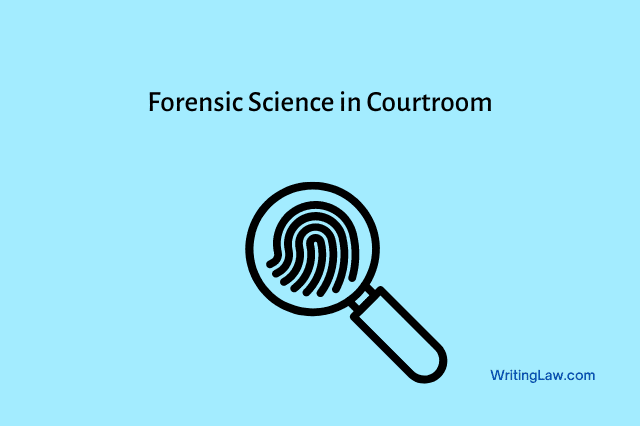
Forensic science is like a detective’s secret weapon in the courtroom. It’s the science of solving crimes and mysteries using clues from the tiniest evidence.
From fingerprints to DNA, forensic science helps courts uncover the truth. Forensic science, applying scientific principles to criminal investigations and legal proceedings, plays a pivotal role in modern courtrooms. Its impact is profound, as it bridges the realms of science and law, aiding in the pursuit of justice.
In this article, we’ll explore how forensic science works in the courtroom and why it’s so essential for justice.
Role of Forensic Science
Forensic science is indispensable for justice because it is an unbiased and scientific arbiter of truth. It provides crucial answers to questions about crimes and incidents by analyzing physical evidence, often revealing hidden facts that human accounts alone cannot ascertain.
By relying on empirical data and rigorous methodologies, forensic science helps establish guilt or innocence with high reliability. Its objectivity and precision ensure that justice is served, protecting the innocent and holding the guilty accountable. Forensic science is an essential pillar of the justice system in the pursuit of truth and fairness.
In many cases, forensic evidence becomes the voice of the silent witness, offering an objective account of events that may have remained concealed otherwise. This is particularly significant when human accounts are unreliable or conflicting. Forensic science thus stands as the cornerstone of justice, ensuring that the innocent are not wrongfully convicted and that the guilty face the consequences of their actions.
Related: The Evolution of Forensic Science in India – Past, Present, Future
Producing Forensic Evidence in the Courtroom
Forensic evidence in Indian courtrooms is typically produced and presented through the following process:
- Evidence Collection: The process begins with collecting physical evidence from crime scenes by law enforcement agencies. This can include fingerprints, blood samples, DNA, firearms, and documents.
- Preservation: Proper preservation of collected evidence is crucial to maintain its integrity. The chain of custody is maintained to ensure evidence is not tampered with or contaminated.
- Examination: The collected evidence is then sent to forensic laboratories for study. Trained forensic experts conduct various tests and analyses to determine the nature and significance of the evidence.
- Forensic Reports: Forensic experts prepare detailed reports outlining their findings after examination. These reports include methodologies used, results, and interpretations.
- Expert Testimony: Forensic experts are often called to testify in court as witnesses. They present their findings, explain the significance of the evidence, and provide expert opinions when necessary.
- Cross-Examination: Lawyers representing both the prosecution and defence can cross-examine forensic experts to challenge their findings, methods, or credibility.
- Admissibility: The admissibility of forensic evidence is determined by the judge. The judge assesses whether the evidence is relevant, reliable, and meets legal criteria for admissibility.
- Bench Assessment: In bench trials, the judge assesses the evidence and reaches a verdict.
- Verdict: Based on the presented forensic evidence and other factors, the court reaches a verdict, either finding the accused guilty or not guilty.
Related: What Is the Role of Forensic Evidence in Criminal Investigations?
Challenges faced to present Forensic Evidence in courtrooms
Presenting forensic evidence in Indian courtrooms, while crucial for ensuring justice, comes with several challenges:
- Lack of Standardization: Forensic practices and protocols in India often lack standardization. Different laboratories and experts may employ varying methods, leading to discrepancies and challenges to the credibility of evidence.
- Resource Constraints: Many forensic laboratories in India are understaffed and underfunded, leading to backlogs in evidence processing and delays in court cases.
- Quality of Evidence: The quality and preservation of evidence collected at crime scenes can be suboptimal due to inadequate training of law enforcement personnel and forensic experts.
- Chain of Custody Issues: Maintaining a transparent chain of custody for evidence is essential. However, lapses can occur during evidence handling, raising doubts about its integrity.
- Admissibility Challenges: Indian courts can be stringent about the admissibility of scientific evidence. Ensuring that evidence meets the legal criteria for admissibility can be a challenge.
- Limited Awareness: Judges and lawyers may have little awareness of complex forensic techniques, making it challenging to effectively present and cross-examine forensic evidence.
- Backlogs and Delays: Overburdened court systems and forensic laboratories can lead to significant delays in cases involving forensic evidence, affecting timely justice delivery.
- Ethical Concerns: Issues related to privacy, consent, and ethical practices in collecting and analyzing biological evidence, such as DNA samples, can arise.
Conclusion
In conclusion, forensic science is indispensable in upholding justice because it employs scientific rigour and objectivity to establish the truth. It safeguards the rights of the innocent, holds wrongdoers accountable, and contributes to preventing future crimes.
Related Reading: Application of Social Research Findings in the Field of Law
- Limitation on Granting Injunctions Under Specific Relief Act - 4th June 2024
- Techniques for Proper Case Management in Civil Courts in India - 3rd June 2024
- Power of Odontology in Law: Unmasking Crime With Dental Clues - 2nd June 2024







